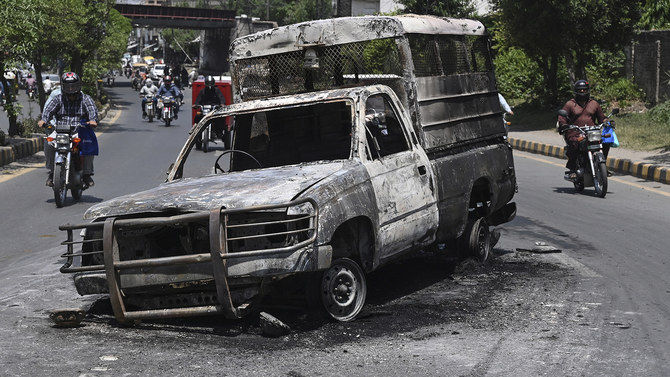ISLAMABAD: Mansoor Usman Awan, the attorney general for Pakistan (AGP), on Friday informed the Supreme Court that the army had 102 people in its custody who had been involved in violence that broke out in the South Asian country after former prime minister Imran Khan's arrest on May 9, Pakistani media reported.
Pakistan’s government and army have said they will try in military courts suspects accused of attacking army installations in countrywide protests in the wake of Khan's arrest. Military courts operate under a separate system from the civilian legal system. Trials are closed to outsiders, and no media is allowed. Rights groups have criticized the secretive nature of the process.
Four petitions have been filed against the use of military courts to try civilians by, namely, former Chief Justice Jawwad S. Khawaja, prominent lawyer and politician Aitzaz Ahsan, Pakistan Institute of Labour Education and Research Chief Executive Karamat Ali, and former PM Khan.
A seven-member bench, led by Chief Justice of Pakistan (CJP) Umar Ata Bandial, on Friday resumed hearing pleas challenging the trials of civilians in military courts, Pakistan's Dawn newspaper reported.
"The AGP took the rostrum at the tail-end of today’s hearing, telling the seven-member bench that 102 people were in the army’s custody, adding that none of these were women or minors," the report read.
“No journalists or lawyers are in the army’s custody.”
AGP Awan said the authorities had doubts about one of the suspects in custody being below 18 years of age. “His tests are being conducted. If he is less than 18 years of age he will be released,” he said.
A day earlier, the chief justice had ignored a request to issue an interim order to stop the trials of civilians in the military courts, saying it was not possible without hearing AGP Awan first.
While issuing notice to the respondents, the court had asked the AGP to furnish the total number of detained suspects in civil and military custody on account of offences allegedly committed by them on May 9.
A bruising year-long standoff between Khan, arguably Pakistan’s most popular leader, and the army came to a head when military buildings and property were ransacked last month, allegedly by Khan supporters, following his arrest in a graft case. Khan was later released on bail but hundreds of his followers were arrested in the aftermath and the military said it would punish all those who had damaged military properties or instigated people to do so.
Many of the top members of Khan’s party have since jumped ship and the government of PM Shehbaz Sharif has threatened to ban Khan's Pakistan Tehreek-e-Insaf party.
Meanwhile, authorities have begun the process of trying dozens of people, including members of Khan’s party, suspected of involvement in the protests in military courts, usually reserved for service members or those categorized as enemies of the state. Khan says the purpose of military courts, in this case, is to put him in prison and dismantle his party.
Pakistan’s Army Act of 1952 established military courts primarily to try members of the military or enemies of the state. Civilians can only be tried there under a federal government order.
Civilians accused of offenses such as waging war against the armed forces or law enforcement agencies, attacking military installations, or inciting mutiny, can be tried at military courts.
















